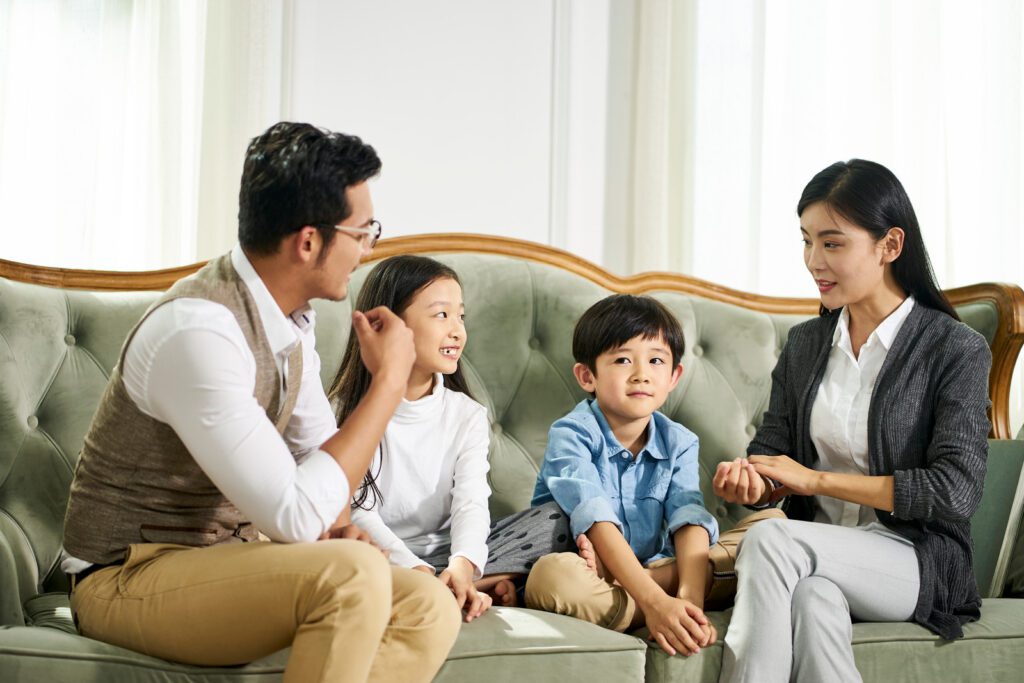Deciding to divorce is hard. Talking to the children about the divorce is even harder. Parents want to protect their children but aren’t sure how. Some think waiting until everything is decided is best; others plunge into the full story of the decision. Below are tips for when and how to have the conversation—along with samples of what to say.
Should we talk to our children about the divorce when we decide we are divorcing– or should we wait?
While every family’s situation is unique, telling early is usually better than waiting—for several reasons.
- Children likely know something is coming. Keenly intuitive, children know when something is up with their parents’ relationship. So, if you don’t share what is happening, your children begin to fill in the blanks themselves. Often, with answers far more scary than the truth. By telling, you offer real information along with the assurance that comes from bringing children “into the loop.”
- Bringing into the loop is important. You don’t want to lose your children’s trust at this pivotal time. Trust lost if they find out from someone else before you tell. No one likes feeling outside their own family. And nothing makes one feel like an outsider like others knowing key information before they do.
- Children need security. More importantly, children’s security comes largely from their parents’ relationship. So, when children sense something going wrong with their parents’ relationship, their sense of security suffers. By telling them what is really going on, you reestablish security for children through discussing how you both will continue caring for them.
- Talking to children helps them trust their instincts. When children sense something is wrong between parents, but parents act like everything is fine—that confuses children. Children begin to question their own impressions and instincts. When you share what is going on, this adds to children’s sense of security. Children learn they can trust their parents to be honest and they can trust their own instincts.
- Talking builds trust. Everything comes back to trust. All relationships are based on trust. When children feel excluded from discussions, experience the disconnect between what they are sensing and what parents are saying, and live in an atmosphere of conflict (expressed or repressed)–trust in parents breaks down. Conversation reestablishes the sense of connection and trust. Trust needed as the family navigates coming changes.
What do we tell?
Basics to cover:
Tell the decision—stay away from the “whys”—While talking to children about the coming divorce is important—they do not need to hear the details of why. Even though they may ask.
The best statements are to the point. “We have decided we are going to divorce. (Or, for younger children, “Mommy and Daddy (Mommy and Mommy/Daddy and Daddy) are not going to live together anymore.)
When children ask “Why?” the best response may be, “This is a decision we made for our family. At some point we may talk about why, but for now just know we have tried to make our marriage work. Since we can’t, we want to make sure our family works. We have decided we can best take care of you and work with each other if we are apart.”
Even if one of you does not want the divorce, keep that between the parents. (Which can be extremely hard when divorce violates personal values or convictions.)
Yet, revealing this conflict puts children in the middle of their parents. They often feel they now have to defend one parent against the actions of the other. Let friends, extended family, or counselors be your support. Allow children to just be your children. Children of both of you. They have enough to face without the burden of trying to understand all the “whys.” And, they will discover the values of both of you as they share homes with both of you.
“We love you.”—Children need assurance that you love them. Most children fear losing the love of one or both parents–most often because of experiences of friends whose parents divorced. Knowing you will both “be there” for them provides the best foundation for children to adjust to a redefined family.
“We are going to take care of you.” When parents work together to care for children, they rebuild the foundation of security children need to thrive. More, you assuage their deepest fear. Knowing they still have both of you gets children through all the rest.
“This is not your fault.” Perhaps the most important message. Children nearly always feel responsible for their parents’ divorce. Specifically telling them, “This is not your fault” reassures them. You will likely need to repeat this—but telling now is a critical first step.
Answering the “Will I get to . . . .?” Children often have a myriad of questions.
- “Will I get to stay in my school?”
- “Will we have to move?”
- “Will I get to keep my friends?”
- “Can we keep the dog?”
Answer the questions you can—honestly defer those you cannot. Most importantly—DON’T make promises you may not be able to keep.
If you have worked with your mediator to find a way to keep one parent in the home, let children know they will be able to stay in their school. If that is up in the air, offer something like, “We are working hard to figure that out. As soon as we know, you will know.”
While children may be anxious or frustrated by the answers, your openness reaffirms that you are including them and being honest with them. That pattern means more than the actual answers.
Most parents understandably worry about how to talk to their children about the divorce. If you would like more information on how to have this conversation—or any other area of divorce—please call 317-793-0825 or email info@ResolutionMediationIN.com. We look forward to serving you.


